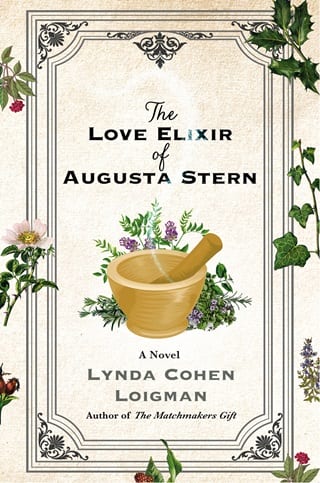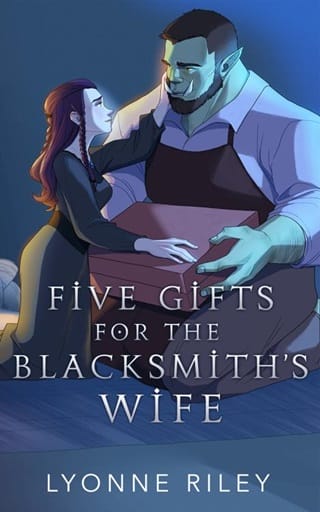Chapter Twenty-Four
TWENTY-FOUR
JULY 1924
For the next several nights, Augusta tried her very best to stay awake. She wanted to be ready to follow Esther into the kitchen at any hour.
But try as she might to keep her eyes open, sleep kept a powerful hold on her. No matter what sounds Esther made, Augusta slumbered on and on. Sleep found her early every evening, and she didn’t stir or open her eyes until the morning light came through her window.
On Friday morning, when she entered the kitchen, Augusta thought she smelled maple syrup and apples. But when she asked Esther if there were pancakes for breakfast, her aunt laughed and shook her head. “No pancakes today,” she said. “That maple smell is fenugreek seeds. And the apple scent is mandrake root.”
Aside from the smells, the only other evidence of Esther’s late-night kitchen activities was the puffiness beneath her eyes.
Augusta’s lips formed a frustrated pout. “I thought you were going to teach me.”
“Not this time,” Esther said. “This is a difficult and dangerous recipe. Too many things can go wrong.”
Later, the maple and apple smells were replaced by the rich scents of braising brisket and a casserole of sweet potatoes and prunes that Esther had been baking in the oven. When Esther cooked, she swayed and hummed. Her face lit up, her hazel eyes sparkled. There was something in the alchemy of the endeavor that transported her to a joyful place.
Bess frowned as she set the table. “George was a wreck at the store today—he spilled the cherries, knocked over the straws, and gave a little boy the wrong flavor ice cream. He’s never broken a glass before, and then today he broke two !”
“Maybe he’s going to propose tonight,” Augusta said.
Bess’s face turned a bilious green. “I think I’m going to be sick.”
Outside, the summer sun was retreating in the slowly darkening sky. “Sit down and rest,” Esther told her. “It’s almost sundown. Your father and George will be here soon.”
From the cabinet over the sink, Esther took a bottle of dark purple wine. Despite the law of the land, wine was allowed for religious purposes, and every month, Augusta’s family received a bottle from their synagogue. There were rumors that the rabbi exaggerated the size of his congregation in order to obtain a larger allocation. In this way, he was able to sell the extra bottles in order to supplement his paltry income. Like so much of the gossip she overheard from the whispering pharmacy patrons, Augusta was never sure what she should and should not believe.
Esther poured a cupful of wine, but before she handed it to Bess, she took a familiar white pouch from her apron pocket and emptied the contents into the liquid. Again the distinctive maple smell, the scent of ripe apples, leather, and hay. Esther mumbled a few words under her breath. “Drink,” she said, handing the cup to Bess. “All of it.”
Bess poured the wine down her throat. When she set the cup back down on the table, Augusta peered into the bottom. She studied the leftover drops, wondering what it might be like to drink them. What would they taste like? What would she feel? She was about to lift the cup to her lips when Esther yanked it away. “That isn’t for you,” she said firmly.
Esther rinsed the cup carefully in the sink, and slowly Augusta came back to her senses. She glanced at Bess and wondered whether their great-aunt’s promise would come to fruition.
“Do you feel any different?” Augusta whispered.
“I don’t think so,” Bess whispered back.
But when the men returned to the apartment, Bess stared admiringly at George as if she were meeting him for the first time. When she lit the Shabbos candles, she was almost too flustered to say the prayer.
As the meal was coming to a close, Solomon Stern cleared his throat and gave George a noteworthy nod. George tapped his spoon against his water glass. “May I have everyone’s attention, please?” he said. “There is something I would like to say.”
He turned his chair until he was facing Bess and took both of her hands in his. “Bess,” he said, “from the first day I saw you, I knew that you were special. I know I don’t have much to offer you yet, but I promise that I will work as hard as I can to give you everything you ever dreamed of. If you let me, I will spend the rest of my life trying to make you happy.” George pulled a ring from his pocket and knelt down on the floor beside her. “Bess, I love you. Will you marry me?”
From under the table, Augusta reached for Aunt Esther’s calloused hand. Her heart thumped wildly in her chest; perspiration soaked her skin. Would Esther’s powder have any effect? What answer would Bess be prompted to give? What would the rest of them say to George if Bess decided to refuse?
Augusta studied her sister’s face. For weeks now—perhaps even months—Bess had been anxious and unwell. But now her expression was serene. When she spoke, her voice was vibrant and certain, as unwavering as the mourning dove’s song when the first streak of sunlight brightens the sky.
“Yes, George,” she said. “I will marry you.”
Later, when Augusta asked her sister what had been going through her mind, Bess said that from the minute George entered the apartment, she knew, without question, that she wanted to marry him. “I’ve never been more certain of anything,” she said.
“So you think Aunt Esther’s powder worked?”
The girls were in Bess’s tiny bedroom, whispering together into the night and looking through stacks of old magazines for sketches of bridal gowns and veils.
“I don’t know,” Bess admitted. “It could have been the powder, I guess, or maybe the wine she put it in. Or maybe it was the excitement of seeing George standing with Papa and smiling at me. All I know is that finally I didn’t have any more doubts.”
“That must be nice,” said Augusta wistfully. “I used to know exactly what I wanted, but the older I get, the more uncertain I become.”
“About Irving, you mean?”
Augusta shook her head. “No. Well, yes, but not only Irving. I used to be positive about going to pharmacy school, but the more time I spend with Esther, the more I wonder whether I should be studying something different.”
“One day you’ll figure it out,” Bess told her. “One day, either with or without Aunt Esther’s recipes, you’ll decide what you want and who you’re meant to be.”
 Fullepub
Fullepub 



